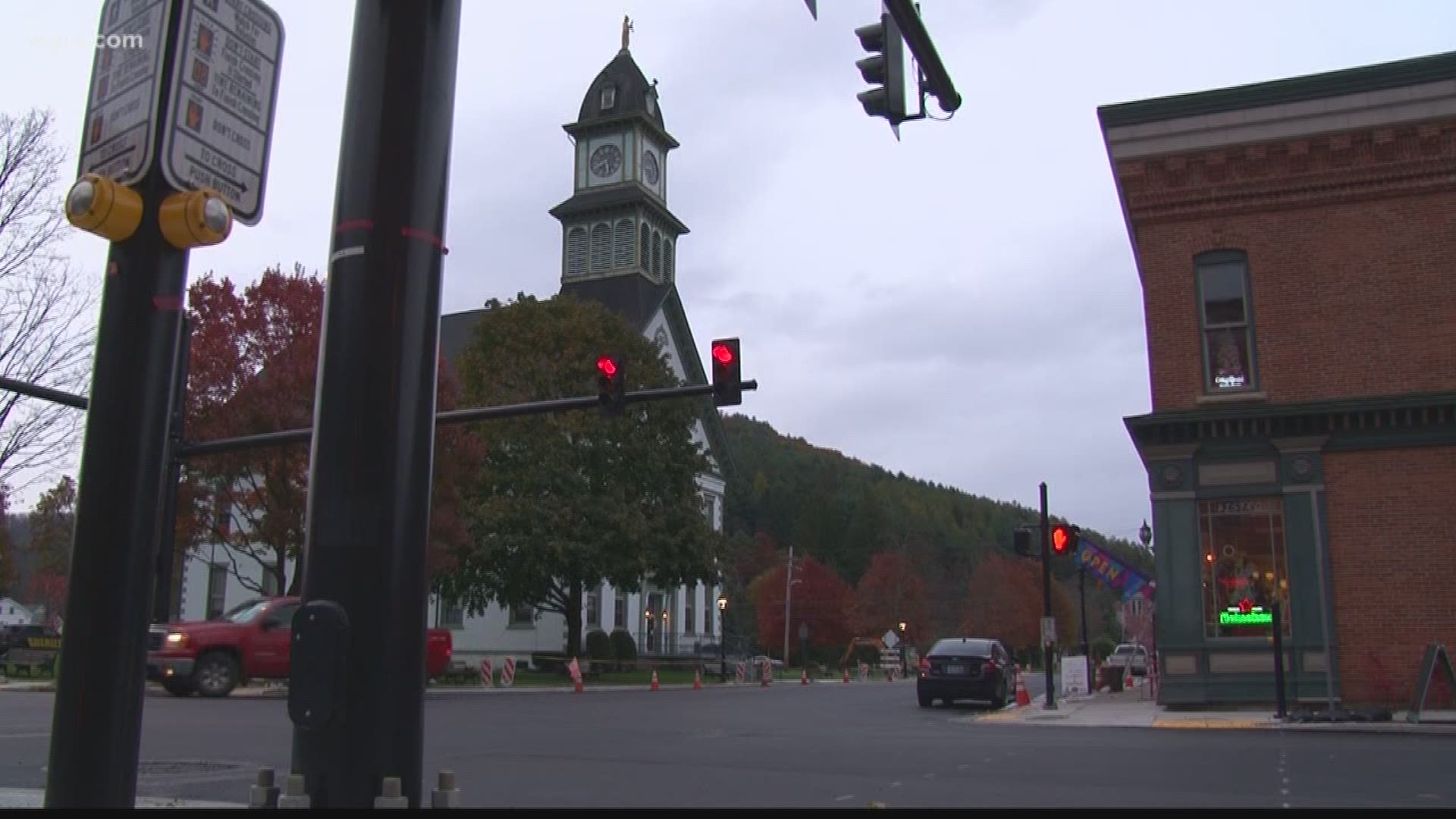Coudersport revitalized after Adelphia scars
After Adelphia went bankrupt and John Rigas went to prison, the rest of the world predicted this small Pennsylvania town would vanish without its cable empire and turn against its hero. But there's a lot you don't know about the resilient people of Coudersport.
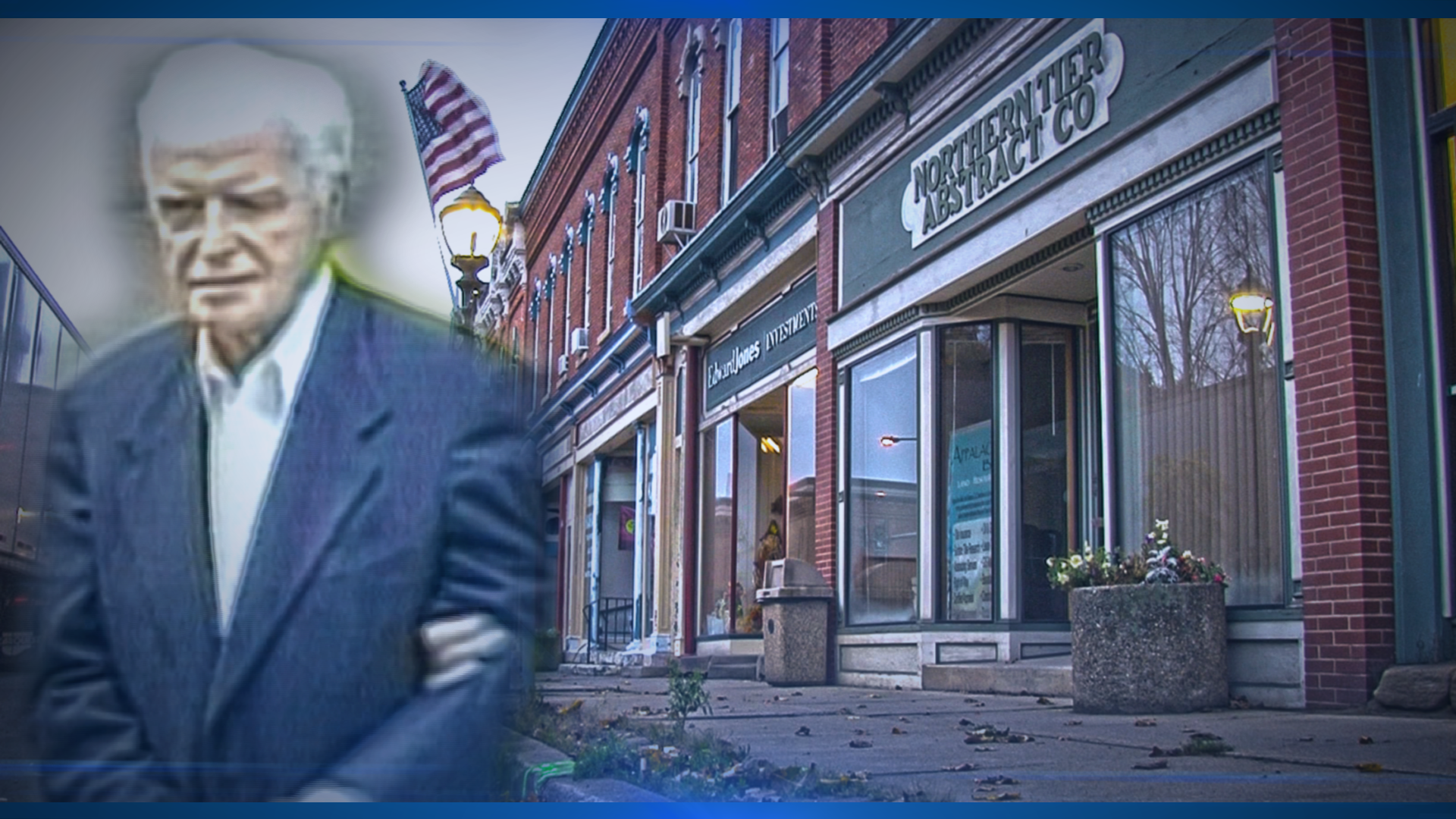
THE REBIRTH OF COUDERSPORT
COUDERSPORT, PA. – The car was running late by at least an hour, maybe longer, but the crowd didn’t seem to mind or even notice.
On this chilly February evening in 2016, more than 100 people dressed in warm winter coats and mittens had clustered near the historic Potter County Courthouse, a 19th-century Greek Revival landmark near the intersection of Second and Main. They were prepared to wait all night, if needed, for that red Toyota Sienna, no matter how low the temperature dropped.

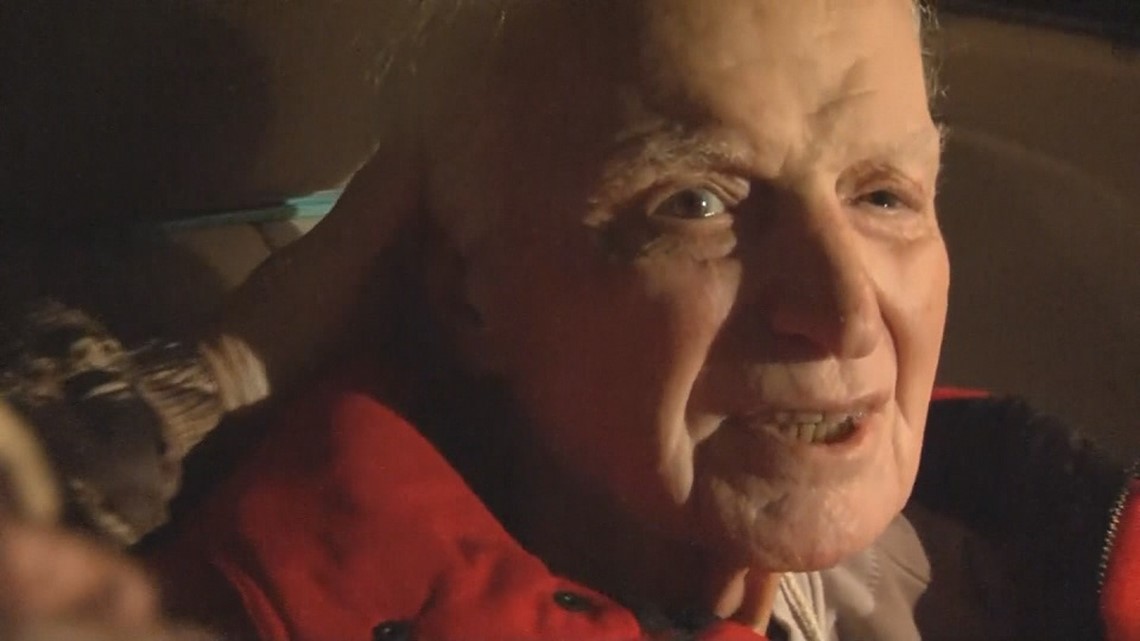
But they didn’t have to wait much longer. Around 8 p.m., a mass commotion ensued on a scale rarely seen in this small north central Pennsylvania community. It was an eruption of joy. The car, apparently, had arrived. The driver carefully rounded the corner from Main Street, inching closer toward the courthouse parking lot, as though not to draw too much attention. Instantly, the crowd swarmed the lot, some sprinting straight across the lawn to make sure they did not miss this moment.
The horde of people, after hurrying over, surrounded the red Toyota and then collectively peered into the passenger’s seat window. That’s when they saw him.
For the first time in nearly a decade, John Rigas was home from prison.


Quietly, the crowd in Coudersport chanted: “God Bless John! God Bless John!” They stretched their WELCOME HOME signs high into the air, seemingly in awe of the man’s presence. The 91-year-old former Adelphia Cable CEO and onetime Buffalo Sabres owner was extremely frail, but that did not stop him from briefly stepping out of the passenger’s seat to share a few hugs with his admirers. Camera lights flashed as Rigas tiptoed his way through the mob of supporters. Thank you, thank you, he whispered, in a hushed and subdued tone.
It was his first public appearance since 2007, a triumphant return to the place the Rigas family has called home for more than a half-century. Coudersport was Adelphia’s hometown, too, before everything fell apart.
Although his corporate fraud conviction carried a prison sentence through Jan. 2018, a judge approved a “compassionate release” for Rigas because of his terminal cancer diagnosis. When he returned home on Feb. 22, 2016, it was feared he only had months to live. But Rigas has persisted. Living comfortably with his family, he has even been spotted at several sporting events and local concerts over the past 21 months.
The festive tone in Coudersport last February perfectly illustrated the complex legacy of John Rigas, who remains largely beloved in north central Pennsylvania but reviled by others in Buffalo and Western New York. To the outside world, Rigas is known as the former Sabres owner who promised financial prosperity for both the team and the City of Buffalo but delivered on neither. When the federal investigation brought Rigas and Adelphia down, countless jobs were lost. Entire retirement savings were wiped out. The City of Buffalo, in desperate need of an economic victory at the time, missed out on a proposed Adelphia headquarters. Many in Western New York have not forgotten that.
In Coudersport, though, the legacy is more complicated. And the story’s not over for them yet.
THE FALL BEFORE THE COMEBACK
Although Rigas was born in Wellsville, N.Y., he is best known for creating Adelphia in Coudersport, a hillside town of about 2,500 not far from the New York border. It's one of many stops along U.S. Route 6 — the second-longest East-West road in the entire country — only a day trip away from Buffalo, Pittsburgh, Cleveland, Philadelphia and New York City. Rigas moved to Coudersport in the early 1950s, after he’d bought a movie theater on Main Street that still, to this day, shows a flick every night at 7:30 p.m. As a young man in his 20s, Rigas then began to pursue a new business venture: cable television. It would lead to the rise of Adelphia Communications Corporation.
The story of John Rigas and Adelphia will always sound improbable, no matter how many times you hear it. The company began as a small mom-and-pop operation, hidden away in the rolling Pennsylvania hills, before growing into the fifth-largest cable company in the United States. By 1997, Rigas had purchased the Buffalo Sabres. Seemingly overnight, Coudersport was now home to a Fortune 500 company and the owner of an NHL franchise. The word “Adelphia” was a household term nationwide, plastered across 30 states and even serving as the namesake for the Tennessee Titans’ football stadium in Nashville starting in 1999.

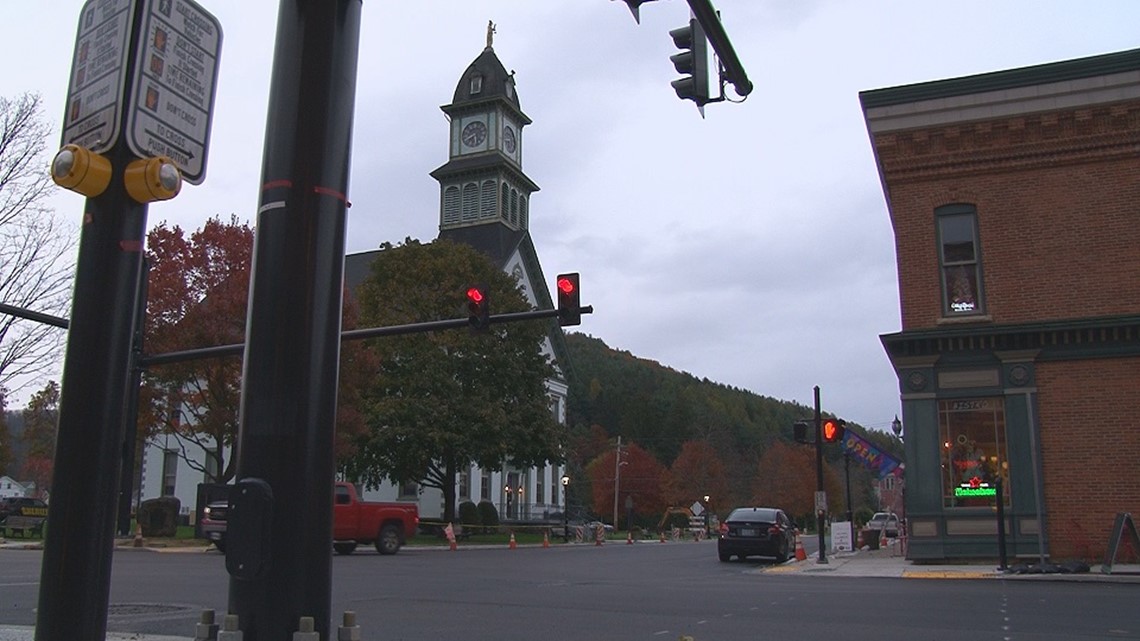
There was little precedent for this type of situation. Towns as small as Coudersport rarely, if ever, had served as headquarters for companies as big as Adelphia, which had more than five million cable subscribers at one point. Nor did towns as small as Coudersport usually have residents with the wealth and influence of the Rigas family. By the turn of the century, Coudersport was booming, with 2,000 Adelphia employees anchoring the Potter County economy and injecting life into local businesses and storefronts.
It all came crashing down starting in 2002, when the Securities and Exchange Commission accused Rigas of orchestrating “one of the most extensive financial frauds to ever take place at a public company.”
According to federal prosecutors, members of the Rigas family hid billions of dollars in company debt and raided Adelphia’s funds for their own personal benefit and business interests. Adelphia was their “personal piggy bank,” prosecutors said, helping to fund their golf course and international trips on a corporate jet, among other luxuries.
The leading U.S. Attorney for the Southern District of New York, a fresh 42-year-old named James Comey, said members of the Rigas family “exploited Adelphia’s byzantine corporate and financial structure.”
Comey said their scheme was intended “to create a towering façade of false success, even as Adelphia was collapsing under the weight of its staggering debt burden and the defendants’ failing mismanagement of the company, while the Rigas family lined their pockets with shareholder dollars.”

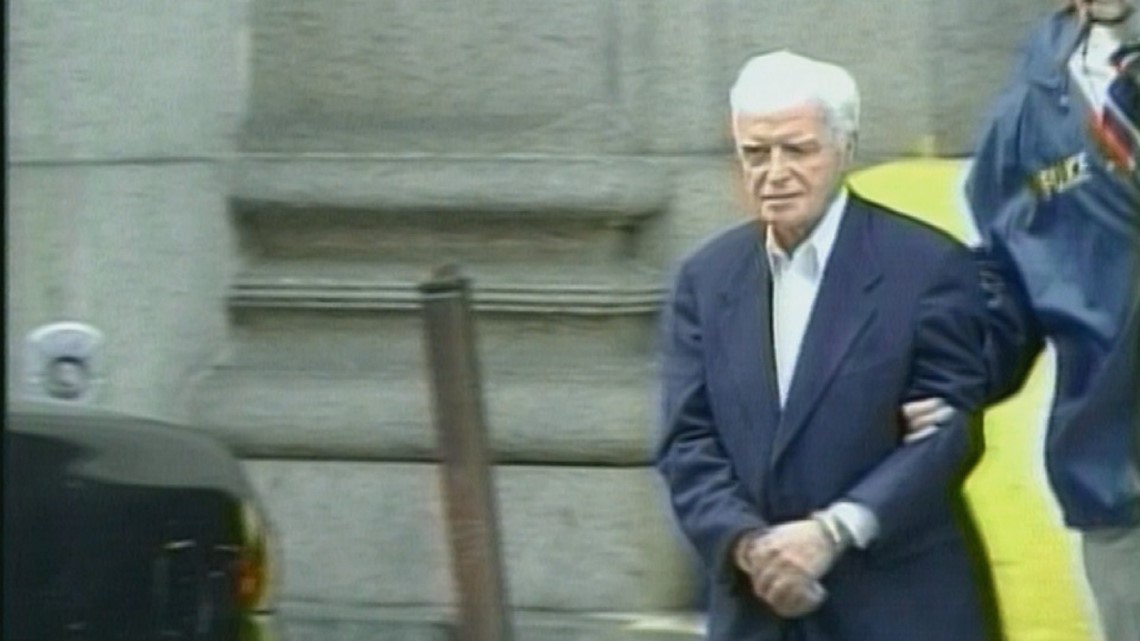
Although they adamantly proclaimed their innocence and pointed out that auditors had signed off on all their Adelphia activities, Rigas and his son, Tim, were ultimately convicted. Adelphia went bankrupt. Eventually, the Buffalo Sabres filed for bankruptcy protection, too. And John Rigas was never able to make good on his promise to bring 1,500 jobs to downtown Buffalo with a new Adelphia headquarters.
Potter County and Coudersport, meanwhile, lost their largest and most important taxpayer when Adelphia went under. Still, despite the devastating economic consequences, many in this community still consider John Rigas a hero, an integral part of their north-central Pennsylvania family. To them, he is a good man who brought pride to their community.
Some say he was scapegoated by an overly aggressive federal government. Almost everybody in town has a story of Rigas’ personal generosity, and many continue to praise his character upon his return home from prison. The criminal case, the convictions, the collapse of Adelphia, the scathing assessments by federal prosecutors, the near-catastrophe for the Buffalo Sabres, none of that seems to overshadow the man they know John Rigas to be, regardless of the outside perception.
But there was a time, in the mid-2000s, when nobody really knew what would happen to this place. Buffalo could, and has, survived the fall of Adelphia. But Coudersport? Losing 2,000 jobs — equivalent to nearly the entire population of the town — just seemed almost too devastating to recover from.
Fifteen years after Rigas was led out into the streets of Manhattan in handcuffs, the lingering effects of Adelphia’s crash are undoubtedly a part of the fabric in Coudersport. But it is not the whole fabric. This community wants the world to know that it is not forever tied to Adelphia.
This town, after all, predates Adelphia by more than a century. It was first incorporated in 1848. In Coudersport, they commend John Rigas for his contributions and defend him as one of their own. That’s why they threw him a celebration. But Adelphia is not the sole purpose for their existence.
After enduring years of hardship, Coudersport is now experiencing a reinvention of sorts, moving forward – not backward – at a pace few could have predicted.
John Rigas has lived to see a town reborn. He will turn 93 years old next week.
THE COMEBACK


On a rainy day in late October of 2017, Bill Pekarski parked himself at a table near the front window at Cream 'n Sugar, a new coffee and ice cream shop on Main Street in Coudersport.
Pekarski has lived here almost all his life, save for a few college years, but he's not sure he's ever liked a place as much as he likes Cream 'n Sugar. It’s a true throwback, an old-fashioned community coffee shop with one small table, a half-dozen chairs and any flavor of ice cream you could imagine.
"Places like this," he said, "they opened up really as a leap of faith."
This store is one of more than a half-dozen new businesses that have sprouted up on Main Street in the past year or so, a clear sign that the post-Adelphia economy in Coudersport is alive and well.
When the company left town, an economic ripple effect caused heavy turnover in the downtown storefronts, but activity has really started to pick back up lately. Some of that can be attributed to an ambitious program that offered entrepreneurs a chance to move into empty stores at a discounted price, without having to sign a year-long lease.
"This is a great little small-town shop," Pekarski said, marveling at the nostalgia he feels every time he walks into Cream ‘n Sugar. “You walk in here, and time can stop out there. You're here in the moment."

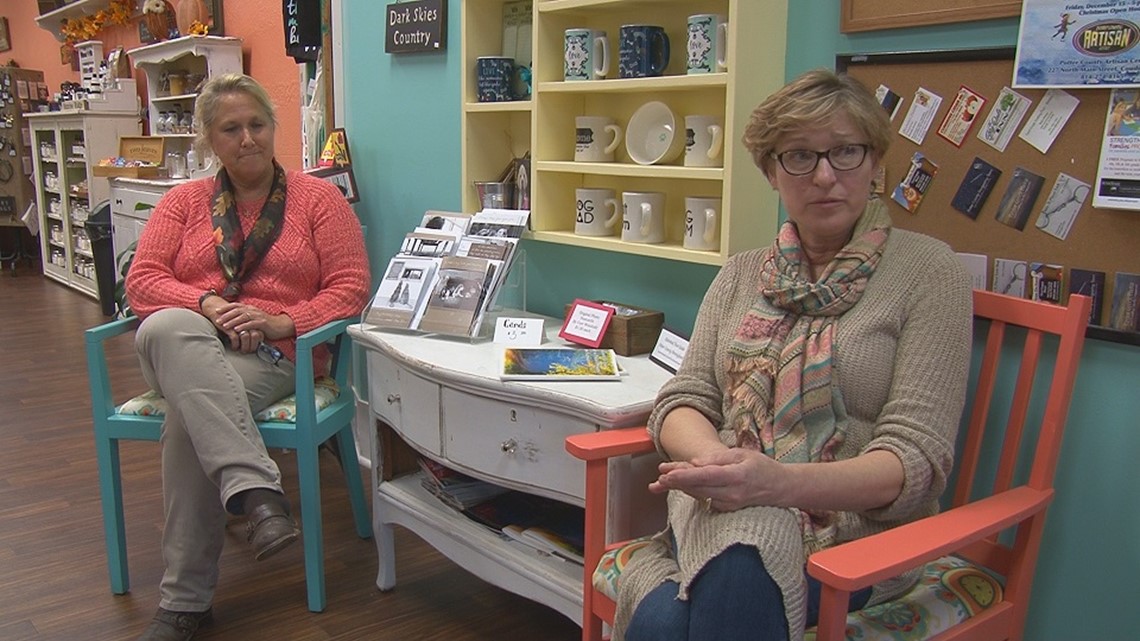
The owners of Cream 'n Sugar are not originally from Coudersport. Patty Giannotti and Mary Jo Stuckey were brought to this town together by pure coincidence, each arriving with their families 20 years ago during the exact same summer. Giannotti came here because her husband had gotten a job at the hospital.
Stuckey came here because her husband had gotten a job with a sister company of Adelphia.
"And I remember when he was going to interview. And I looked on the map, and there's a dot in the middle of this forest. I'm like, 'Jay, there's nothing there. Why would we go there?'" Stuckey said. "And it was a nice surprise when we came up and there's this cute little town."
Giannotti remembers it was nearly impossible to find a place to live back then. Adelphia was in full force. Stuckey remembers those days too, and she admits that after her husband's company left town, they considered moving back to Pittsburgh or Ohio. But they stayed in Coudersport because they raised their kids here and they liked it.
“Adelphia, they were just an employer,” Stuckey said. “But the community’s the community — the people and everything. I don’t think that made or broke us.”
In the winter of 2016, Giannotti and Stuckey saw a vacant storefront on Main Street and decided it was the perfect time to act on a lifelong dream. As members of the Main Street Committee, they also had long craved a downtown shop that would sell treats and coffee.
Cream 'n Sugar was born in July 2016, and the two friends and business partners have thrived for more than a year now. They're committed to this job, too.
So committed that they drive 102 miles to State College, Pa., on a regular basis, just to bring back Penn State Creamery ice cream to serve to their customers in Coudersport.
"We tried to look at things we could do to add to Coudersport," Giannotti said. "We've been very careful about picking out lines of products that don't compete with other places in town."
Giannotti and Stuckey can feel a bit of momentum here, and so can some of the officials in Potter County.
Community Development Director Jennifer Rossman, a Coudersport native, said the town's newest strategy is to capitalize on tourism and the surrounding natural beauty. Cherry Springs State Park, for example, is one of the premier destinations for stargazing, bringing tourists from across the world to Potter County to see some of the darkest skies in the United States. Almost half of the land in the county consists of state-owned forests and open land.
"Tourism, I think, people are starting to grasp onto what's available here. We live where other people vacation," Rossman said. "The communities around the county look at Coudersport and really see it as something that is starting to make a comeback."


Despite the obvious improvements in Coudersport, the post-recession recovery has still been slower across rural America, no matter the town or city. Potter County's unemployment rate of five percent in September, according to data from the Federal Reserve, still hovered slightly above the national average.
Potter County Commissioner Paul Heimel, a former corporate communications manager for Adelphia, said the economic comeback for Coudersport is probably still in the early stages. However, he’s encouraged by the growth of small businesses over the past few years, and he also points to tourism as the future moneymaker.
Younger consumers are more attracted to nature and outdoor activities than ever, Heimel said, which is something Coudersport can uniquely offer.
“We’re king of being reborn in a way that capitalizes on some of the strengths have always been here. Our natural resources, friendly townsfolk,” Heimel said. “We’re a half-day’s drive from about a fourth of the U.S. population – they can get here in half a day – so the idea is to get the businesses that are going to want to pull in those visitors.”
Heimel referred to himself as the typical case study of a former Adelphia employee. He left his longtime job as a local newspaper reporter and editor to serve in Adelphia’s corporate communications office, where he worked for 10 years. When the company was bought out, Heimel had an opportunity to move to a new position in Charlotte, N.C.
He declined.
“I wasn’t gonna do it. Everything is very near and dear to me, and many of us who have lived here all our lives, we wouldn’t leave it. It was all right here: Our family, our community, our comfort level, our sense of community. And we love it here,” Heimel said. “People who come here and get a taste of it— they kind of love it, too.”
When those tourists visit Coudersport, they’re certain to find hidden gems.
John and Olga Snyder, who own a downtown gallery and bistro, have been open for business for nearly eight years now across the street from the Potter County Courthouse. They bought their building from Adelphia and rehabbed it, both inside and out. They painted the walls. They fixed the plumbing system. Admittedly, the first few years of business were not easy.

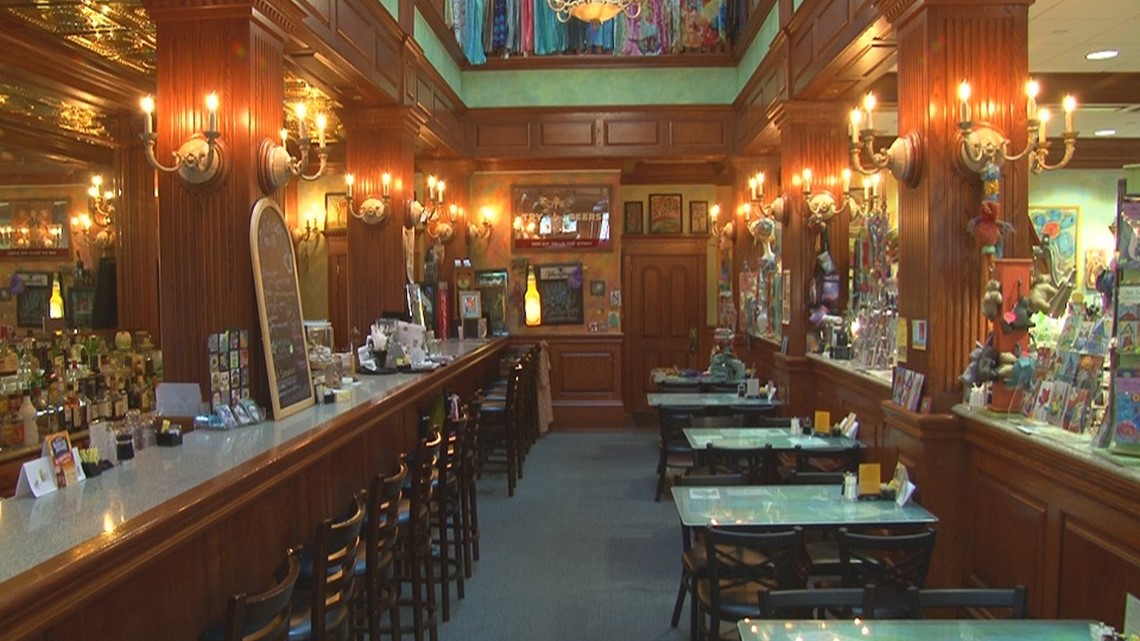
But it got better.
Lately, the Snyders have started seeing a steady stream of tourists stop by their building. Once they get inside, these visitors are usually taken aback by the beautiful, dark woodwork and the impressive art collection.
“People are pretty surprised when they walk through the doors here. They don’t expect to find a place like this,” John Snyder said. “It’s not what you expect to see in north central Pennsylvania.”
Snyder has not lived in Coudersport his whole life, but his parents are both from the area.
So the Adelphia situation did not deter him at all from pursuing a downtown business operation.
“This was home,” he said. “We really wanted to be here.”
Coudersport residents are also enjoying a new streetscape in the heart of downtown. The repaving of Main Street was just completed this fall, a project that was long overdue.
And there’s a new media company in town: Zito Media. The Greek word “Zito” roughly translates to some form of the word “alive” in English.
Zito is run by James Rigas, the youngest son of John. It does not have the type of footprint Adelphia did – far from it – but it does provide cable, Internet and phone services to subscribers in more than a dozen states.
Zito leases space in a former Adelphia building on South Main Street, a building so grand it was once nicknamed the “Taj Mahal.” The original Adelphia headquarters is now a county building.
“We’re just on the cusp of something that I think has been coming for a long time,” Rossman said.
THE LEGACY OF JOHN RIGAS


The Rigas family declined an interview request for this story. His son, Mike, said they appreciated the offer but did not feel it was the right time to speak publicly. John’s health is stable at the moment, he said.
Based on more than a dozen conversations with business owners, local officials, friends of the Rigas family and Coudersport residents, it is clear that many people in this town do not harbor any resentment toward John Rigas or the downfall of Adelphia. That was evident as well on Feb. 22, 2016, when many members of the crowd shared their own stories of Rigas’ generosity and kindness upon his return from prison.
Of course, the people of Coudersport are very aware of the catastrophic effects of the bankruptcy. Many of the residents here experienced it themselves. Mary Jo Stuckey’s husband, for example, had to find another job after his Adelphia sister company left town. Stuckey’s husband now works for James Rigas at Zito Media, as do many other former Adelphia employees.
At the end of their interview inside Cream ‘n Sugar, Stuckey and Giannotti both agreed that many people in Coudersport have been able to separate the criminal case from their personal feelings about the Rigas family. Stuckey said Rigas deserves a second chance, no matter what happened.
“Really, just a good man,” she said. “I don’t know the ins and outs of the story, or what happened – I think there were some bad decisions made and whatever – but I think he was a very kind man. The community loves him, just him personally.”
Giannotti then chimed in, saying she also finds Rigas to be an engaging and caring person. But she, too, recognizes the irony and contrast.
“I understand where you’re coming from. Yeah, it’s interesting, sometimes, when I think about the amount of money people lost, their life savings and stuff. And it’s interesting that most of the people feel so strongly positive,” Giannotti said.

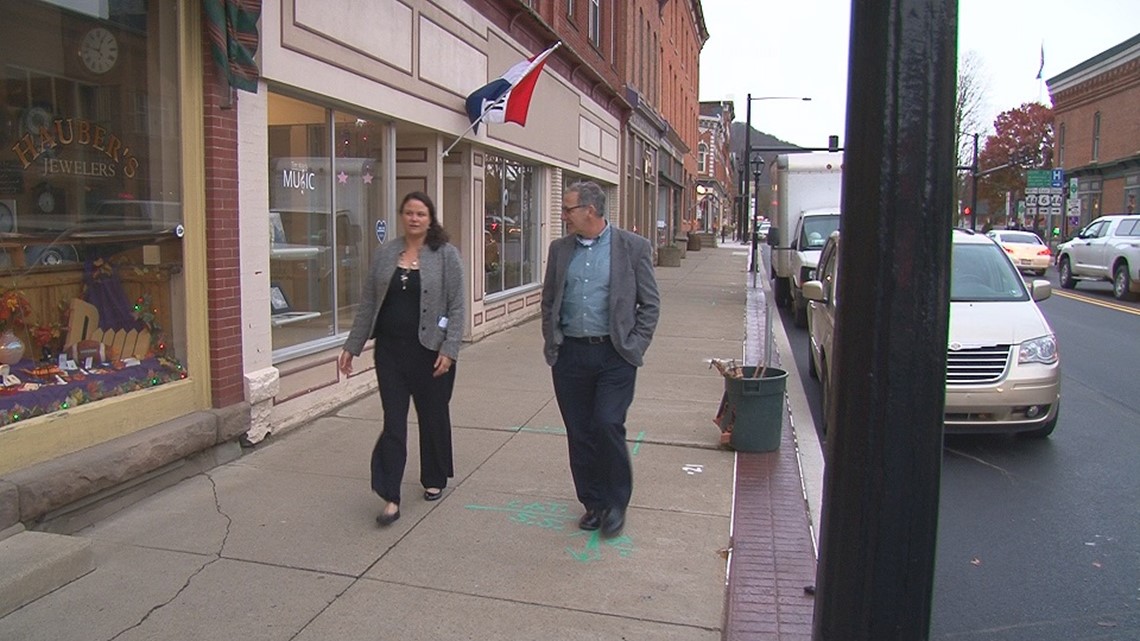
Paul Heimel, who has now been county commissioner for 10 years after his tenure at Adelphia, said he believes Rigas’ legacy has yet to be determined in Coudersport.
“He seeks vindication. I know the family very well. He’s not content that, OK, he’s been released from prison. He seeks vindication. They’re fighting through the courts, it’s a long slog,” Heimel said. “So that’s the goal. The history has not really been written, and it’s a work in progress, and I think people’s feelings about it… they’re mixed.”
Bill Pekarski, who worked in Heimel’s department at Adelphia, takes issue with the prosecution of Rigas.
“The government was in such a hurry to make an arrest, to make a case, and to have their ‘perp walk’ on TV. So many things got overlooked. It was just… It was tragic,” Pekarski said. “People who know the man know how sincere he is and what his dreams were and what his beliefs were. And you cannot find anything wrong with his character. His character defines the man and his character is exceptional.”
Pekarski admitted that the transition after Adelphia was rough for him personally, but after considering his options, he decided to go back to school to find a new career path. He wound up becoming a nurse and returned to Coudersport to work at Cole Memorial Hospital right after graduation.
These days, Pekarski spends a lot of his time writing and reflecting on many life topics, including Coudersport. He’s looking forward to July 2018 and the upcoming Elliot Ness Fest, which will celebrate one of the most famous federal agents in American history who happens to have strong connections to Coudersport. It is a little-known fact, but Ness moved to Coudersport in the mid-1950s, not long after John Rigas moved to town. Ness spent the final days of his life here before he died in 1957.
Those are the stories Pekarski uses to reinforce Coudersport as a community with its own history and identity, free and untied from Adelphia.
“This is hometown,” Pekarski said. “We’re not going anywhere.”
Certainly, though, it has been a long 15 years in Coudersport. But over the years, as the national media attention faded and the Adelphia scandal exited the public consciousness, something funny has happened. The town has gotten back to normal, operating as though the whole Adelphia thing had never happened in the first place.
That, by itself, may be a minor miracle. Back on May 28, 2002, in the early days of the Adelphia case, a writer from The New York Times visited the town and penned a story with a headline, “In Hometown of Adelphia, Pride, But Worry About the Future, Too.” The article detailed the community’s anxiety as 2,000 Adelphia jobs hung in the balance. It was the perfect example of the overriding narrative about Coudersport and Adelphia. The two seemed co-dependent on each other, as though one couldn’t exist without the other. Fair or not, that was the portrayal.
At the end of that article, a local attorney named George Stenhach was quoted as saying the following: “Coudersport existed before there was an Adelphia, and as great a tragedy as this is, Coudersport will survive this.”
Fifteen years later, Bill Pekarski can confirm that Coudersport is still here, indeed. It has survived.
“Adelphia doesn’t define this community,” Pekarski said. “The people here define our community.”


